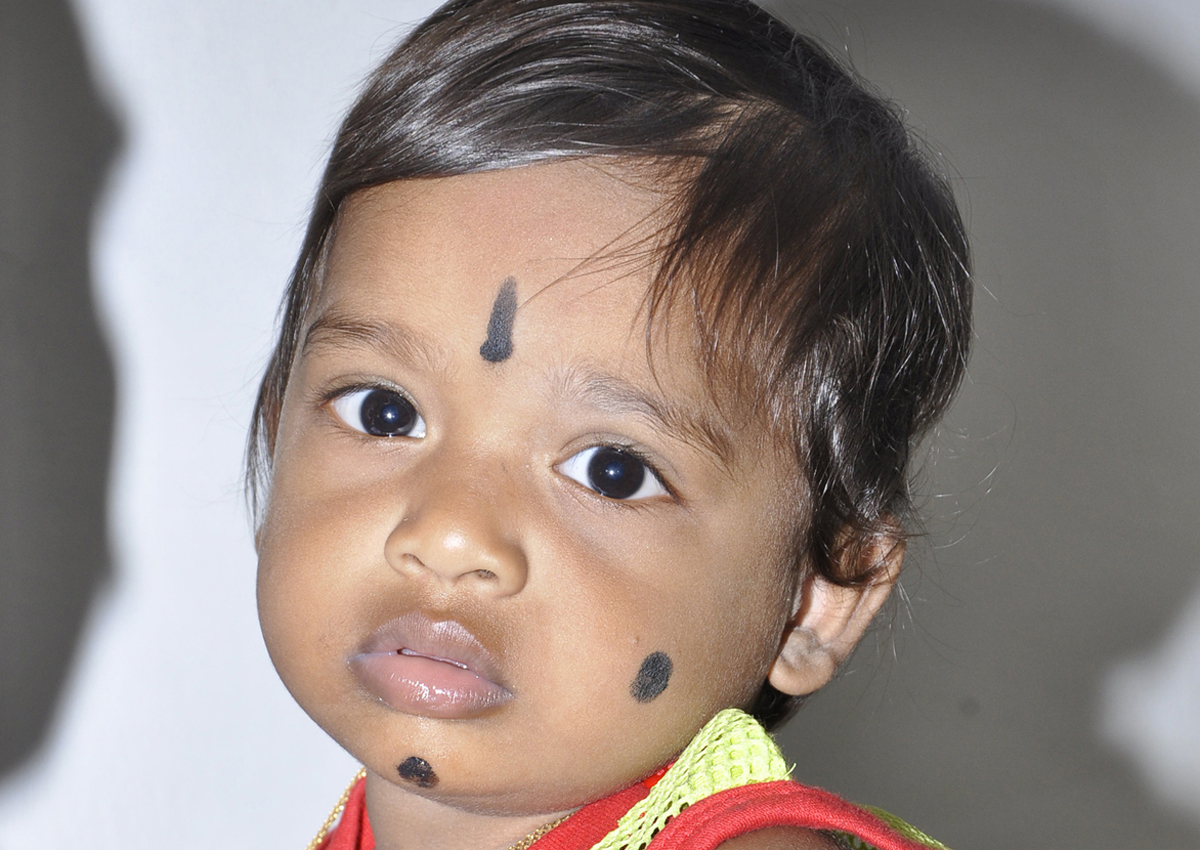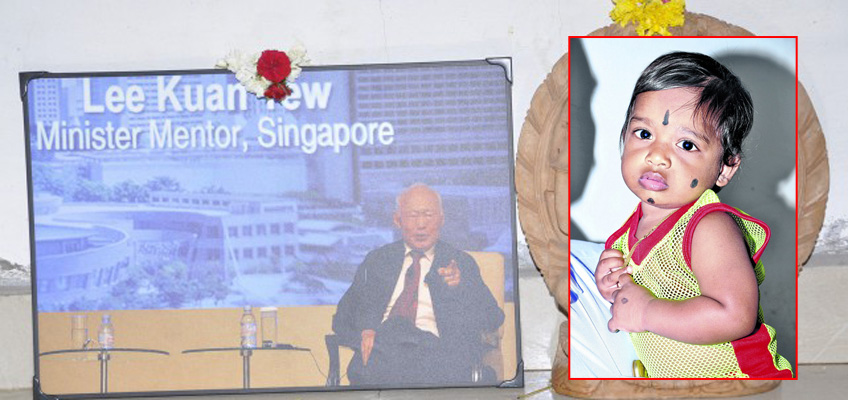Lee Kuan Yew Jayaprakash tries to stand up, and when he manages with the help of a small green plastic chair, he immediately looks at his mother Bhagiyalakshmi and flashes a wide toothy smile.
Lee, as he is known by his family, then sits back on his haunches and launches at full speed towards the front door of the small four-room house that leads out to a newly paved road in the town of Mannargudi in southern Tamil Nadu state.
His mother scoops him up and admonishes him gently with a smile.
The one-year-old baby – who sports black dots made with kohl on his face to ward off the evil eye or any negative energy – gurgles with delight even as his older sister Subhasini, aged two, chants: “Lee, Mr Lee, Lee.”
“Lee is very active. It’s difficult to keep up,” says his 28-year-old mother, Madam Bhagiyalakshmi, who speaks only Tamil, as she goes about her household chores.
“If he decides he wants something, he can’t be dissuaded. He is very stubborn. Otherwise, he is a calm baby and cries only when he is hungry.”
Lee was born at 1pm on March 23 last year in Mannargudi, a town of 70,000 people which, along with a handful of nearby villages like Ullikotai and Pudukkottai, have strong links to Singapore.
His father, Mr B. Jayaprakash, a bus driver, decided to name him after Singapore’s founding Prime Minister Lee Kuan Yew, as he was moved by an outpouring of grief in the area over the death of the political leader.
Many families in these parts either have family members working in Singapore or know someone who has moved to the city-state to work. Remittances have transformed lives, with scores of families once worried about their next meal swopping thatched huts for mini bungalows complete with gardens and at least one car.
They credit the improvement in their circumstances to Mr Lee, and his death last year was mourned deeply.
In Mannargudi, a memorial was held, while scores of families in the town and nearby villages put up posters complete with condolence messages and photographs of Mr Lee in front of their houses. Such banners are put up to mark a death in the family.
Over the past year, baby Lee has become something of a mini celebrity in the area. Many have also heard about him from relatives in Singapore.
“People call out ‘Lee, Lee’ when I am out and about in the town. I have come to be known as Lee’s father,” says Mr Jayaprakash.
The 38-year-old, who drives a bus for a government bus company, looks on indulgently, and describes his son as “brilliant” and “sharp”. He already drinks from a metal sippy cup, and his favourite toy is not any of the numerous ones given to him by his father, but the latter’s cellphone.
In Tamil Nadu, it is not uncommon for parents to name their baby after prominent Indian or even foreign personalities. Dravida Munnetra Kazhagam party chief M. Karunanidhi, for instance, named his son Stalin.
Still, Mr Jayaprakash’s decision, made without consulting his wife or the rest of his family, was met with some incredulity by their extended family members and friends.
Mr Venkata Krishnan, 42, a family friend, says he was shocked when he first heard the name, and thought the family would not accept it. “Now, there is no problem. Because of the posters and banners, even people like me who didn’t know Lee Kuan Yew got to know him,” he says. “It is no longer Jayaprakash’s house. It is Lee’s house.”
The entire family, too, has embraced the name, except for Lee’s grandmother, who still cannot wrap her head around it. “My mother just calls him ‘thambi’ (interchangeably used for son or brother),” says Madam Bhagiyalakshmi. “It is a good name. My only wish is that he does well in life.”
In the prayer room of their house, a garlanded photograph of Mr Lee is placed next to the statue of the god Ganesh.
In the adjoining bedroom, a tiny hammock, made out of white cloth, hangs from the ceiling. This is where Lee sleeps.
His parents, who plan to feed a dozen orphans to celebrate their son’s first birthday and have put up a banner outside their house, say Lee is more adventurous and sure of himself than his older sister.
Mr Jayaprakash, a school dropout of modest means earning 10,000 rupees (S$205) a month, dreams of a university education and a well- paying white-collar job for his son.
“I never learnt how to speak English but I want my son to speak it. I have decided I am going to put Lee in a private school,” he says, adding that he is putting away 2,500 rupees from his salary every month for his son’s university education, and 1,000 rupees for his daughter.
However, his son’s peculiar name has also caused him some unintended embarrassment. “Everyone is asking me, ‘you have given this name but have you gone to Singapore?’ and I feel strange about it. I want to go to Singapore,” he says. “I don’t know how I will do it, but I want to visit Singapore at least once before my son turns two.”
gnirmala@sph.com.sg

This article was first published on March 23, 2016.
Get a copy of The Straits Times or go to straitstimes.com for more stories.












